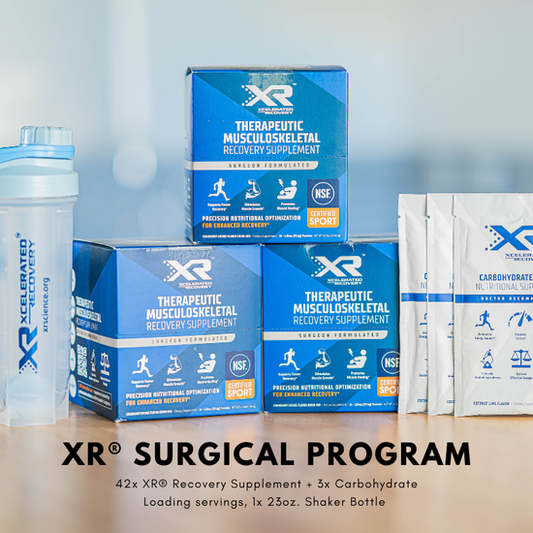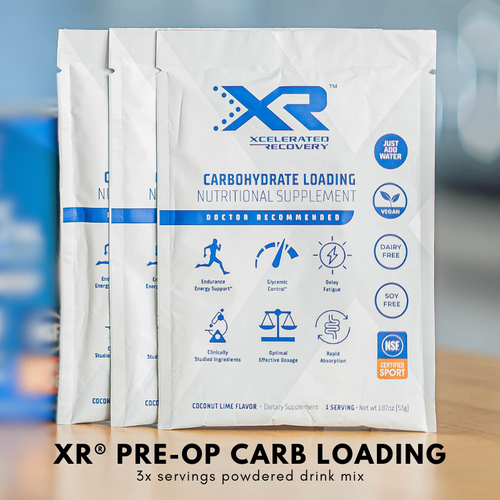
The Role of Essential Amino Acids in Perioperative Recovery Following Bariatric Surgery
Share
Bariatric surgery, particularly gastric bypass, is a life-changing procedure for individuals struggling with obesity. However, it comes with its own set of challenges, including the loss of skeletal muscle, which can impact long-term health outcomes. In this blog, we'll explore the benefits of essential amino acids (EAAs) as a nutritional strategy to mitigate the loss of muscle mass after gastric bypass surgery. We will draw upon a study titled "Essential Amino Acid Ingestion as an Efficient Nutritional Strategy for the Preservation of Muscle Mass Following Gastric Bypass Surgery" by Christos S. Katsanos, James A. Madura II, and Lori R. Roust to support our discussion.
The Challenge: Loss of Skeletal Muscle After Gastric Bypass
Gastric bypass surgery has proven effective in helping patients achieve significant weight loss. However, it often leads to the unintended consequence of skeletal muscle loss. Skeletal muscle is vital for overall health, as it plays a key role in metabolism and physical function. Therefore, finding ways to prevent this muscle loss is essential for the long-term success and well-being of bariatric surgery patients.
Additional Issues Related to Muscle Loss After Bariatric Surgery:
-
Impaired Metabolism and Reduced Performance: Muscle loss can lead to a decreased metabolic rate, making it more challenging to maintain a healthy weight and overall well-being. Patients may experience lower energy levels and reduced physical performance, hindering their ability to engage in regular physical activities.
-
Inadequate Intake of Whole Intact Protein: Many individuals who undergo bariatric surgery struggle to consume sufficient whole intact protein due to dietary restrictions, gastric capacity limitations, or intolerance. This deficiency can further exacerbate muscle protein loss and hinder recovery.
The Role of Protein Synthesis:
To understand why muscle loss occurs post-gastric bypass, we need to examine the balance between muscle protein synthesis and breakdown. Current research suggests that a reduced rate of protein synthesis is a significant contributor to this issue. This is due, in part, to the challenges associated with maintaining an optimal dietary protein intake after surgery, as well as the fact that unlike other macronutrients, protein/amino acids are not stored in the body.
Essential Amino Acids (EAAs) as a Solution:
One promising avenue for addressing this problem is the ingestion of essential amino acids (EAAs). EAAs are amino acids that cannot be synthesized by the body and play a primary role in regulating muscle protein synthesis. The study by Katsanos et al. highlights the potential of EAAs in ameliorating muscle protein loss after gastric bypass surgery.
Efficiency of EAA Ingestion:
What makes EAAs particularly intriguing is their efficiency in stimulating protein synthesis relative to the amount ingested compared to intact protein. In other words, a smaller quantity of EAAs can potentially have a more significant impact on muscle protein synthesis compared to larger quantities of whole proteins. This efficiency is vital for patients who may struggle with post-operative dietary restrictions or limitations.
Broader Applications and Aerospace Use:
It's worth noting that the use of free form amino acids, including EAAs, is not limited to bariatric surgery. These supplements have found application in various medical subspecialties where muscle preservation and recovery are critical. They are also used in sports nutrition and fitness to support muscle growth and repair. Additionally, astronauts facing the challenges of extended space missions rely on these amino acids to help counteract muscle atrophy in microgravity environments. This underscores the versatility and importance of this nutritional strategy in diverse fields.
Conclusion:
The study by Katsanos and colleagues sheds light on the importance of addressing skeletal muscle loss in patients undergoing gastric bypass surgery. Ingesting essential amino acids represents a promising nutritional strategy to prevent the loss of lean body tissue and promote better long-term health outcomes. However, it's important to note that while this research is promising, it's not a panacea, and it should be considered as part of a comprehensive approach to post-operative care and nutrition.
Incorporating free form amino acids, like EAAs, into the post-operative care and nutritional plans of bariatric surgery patients may help address the complex issue of muscle loss and reduced performance. Additionally, their proven effectiveness in other medical contexts and even in space missions underscores the significance of this nutritional strategy in various disciplines. While further research is needed to fully understand their role in perioperative recovery, they hold promise as a valuable addition to the toolkit of healthcare professionals working with bariatric surgery patients.
References:
Influence of dietary protein and its amino acid composition on postoperative outcomes after gastric bypass surgery: a systematic review
Essential amino acid ingestion as an efficient nutritional strategy for the preservation of muscle mass following gastric bypass surgery
Bariatric surgery reduces branched-chain amino acids' levels: a systematic review and meta-analysis








